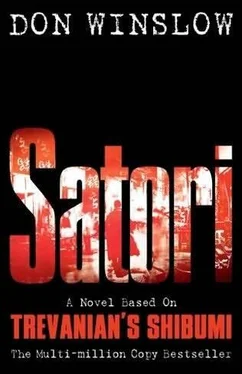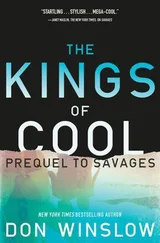He knew that he was risking his life, knew that there was a strong possibility that any of the other strollers in the park, or one of the tai chi players, or a street hawker, even one of the other monks might be a police spy waiting to see who came to pick up the message.
Then one of two things would happen. Either they would arrest him immediately, or they would lay back and follow him, hoping that he would lead them to the entire cell. But he knew that he wouldn’t let that happen – he was experienced enough to spot surveillance, and skilled enough to dispatch himself with his own hand should it come to that.
Xue Xin would not allow himself to be captured.
He had been captured before.
Tortured, he had learned what no man should have to learn – the sounds of his own screams – and when they returned him to the cage it was only the kindness of his cellmate that kept him alive, gave him hope when he wished to die, shared the meager handfuls of rice that were their starvation diet.
Now, ten years later, he still limped.
He knew that he shouldn’t be alive at all. His captors had decided to kill them all before the Japanese took over, so they marched them to a field outside the prison, handed them sharpened sticks, and made them dig a long trench.
When the common grave was finished, they were lined up in front of it, and Xue Xin was eager for the bullet that would end this life. But the commandant explained that they were not worthy of expensive bullets, and would be slashed and stabbed to death instead.
Then it started, a blur of silver blades and spraying blood, and Xue Xin felt himself fall backward into the trench and was glad for death. It seemed days later when he felt the dirt falling on him, and he wanted to scream that he was still alive but he swallowed his fear and pain with the dirt.
The monks came that night.
Like ghosts they padded through the fog and dug with their hands, literally pulling him from the grave. Weeks later he could stand, weeks after that he could walk, if you could call it walking. He had bad dreams every night, waking in that grave.
Now Xue Xin walked past the loosened tile in the bridge, deftly snatched the message, and tucked it into his robe. In his other hand he clutched a slim sharp blade, meant for his belly if they came for him or if he detected anyone following him.
But no one did.
He walked undetected out of the north gate into a hutong in the north-central district. Five minutes later he was in the back of a small house, squatting by the dim glow of a small radio transmitter, into which he read the coded message.
He left the house reciting, “On mani padme hung.”
The jewel is in the lotus.
THE BLADE PLUNGED deep into the victim’s belly.
The man gasped and then tried to stuff his innards back into his stomach as he staggered through the alley near Luang Prabang’s crowded marketplace, but it was far too late.
The Cobra jerked the knife back, turned away, and walked quickly out the dark alley into the streets of the northern Laotian town.
It all had to do with something called “Operation X,” but the Cobra didn’t really care. All that mattered was the money, and the payments from this client were always prompt and reliable.
The Cobra fingered a small medallion and could feel the outline of the embossed face and the script -
Per tu amicu.
For your friendship.
A LARGE CROWD had formed in Tiananmen Square.
Traffic stopped, and Nicholai looked out his window to see a military caravan – Soviet trucks and American Jeeps – come past as the crowd hooted and jeered.
Nicholai spotted the objects of their derision.
Two men, one Western and one Asian, stood in the back of an open Jeep, propped up by PLA soldiers holding their legs, their arms bound to their sides by ropes. In an open truck behind them, a squad of soldiers sat, their rifles held barrel up. Members of the mob threw garbage and old vegetables, shouted insults, rushed at the Jeep and spat at the prisoners.
“Spies,” Chen explained, watching for Nicholai’s reaction. “An Italian and a Japanese. They were plotting to assassinate the Chairman.”
“Truly?”
“They confessed.”
Chen’s car fell in behind the military caravan as it slowly made its way past Tiananmen Square toward the Temple of Heaven. The parade halted at the Bridge of Heaven and the crowd swarmed around it like an amoeba. Soldiers jumped out of the truck and roughly pulled the prisoners from the Jeep and shoved them to an open space at the base of the bridge. Other soldiers used the rifles to push people back, as an officer formed other soldiers into a file.
“You execute them in public?” Nicholai asked.
“It teaches a lesson.”
In a reversal of ethnic stereotypes, the Italian stood silent and stoic while the Japanese prisoner’s legs gave out and he dropped to his knees, sobbing. A soldier yanked him back and then Nicholai saw a man dressed in a long black coat and black hat emerge from the back of a car and walk toward the prisoners.
He held sheaves of paper in his left hand.
“Kang Sheng,” said Chen, a tremor of fear in his voice.
Nicholai watched Kang strut in front of the crowd, stand beside the prisoners, and shout the proclamation that recited their crimes and condemned them to the people’s righteous rage. The Chairman in his mercy had allowed them to be shot instead of strangled, beheaded, or simply beaten to death by the mob.
Kang finished the speech, posed for a moment, and then stepped offstage.
The officer shouted an order and the rifles were lifted with a metallic clatter that echoed through the crisp air. The Italian braced himself, but Nicholai could see the stain of urine darken his trousers. The crowd saw it too, and made much fun of it.
“Look! He pisses himself!”
“He drank too much wine last night!”
The Japanese dropped to his knees again. A soldier started for him, but the annoyed officer shook his head, barked another order, and three soldiers adjusted their aim. The officer had a feel for the moment, and he lifted his arm but paused for dramatic effect until the crowd quieted.
There was a moment of silence, and then the officer dropped his hand and shouted. The rifles roared and Nicholai saw the two prisoners crumple to the ground.
The Temple of Heaven, its famous blue-tiled roof glistening in the sun, loomed over them.
“Spies,” Chen concluded.
NICHOLAI’S MESSAGE was relayed five times before it reached Haverford in Tokyo. Still, it arrived accurately, and Haverford decoded it instantly.
Zhengyici Opera, Thursday night.
The staff at the CIA station in Tokyo rushed into action. Within minutes, Haverford had a map of Beijing and several aerial photographs in front of him, and he drew a red circle around the Zhengyici Opera House.
Minutes after that, a Chinese refugee, a Beijing native, was in the room and identified the building as being in the Xuanwu District, southwest of the Old City, not far from the Temple of Heaven. One of the oldest parts of the city, it was a rabbit warren of narrow hutongs and old tenement houses. Before the Communist takeover, the area was host to the Bada Hutongs, the redlight district.
Haverford thanked and dismissed him, then got on a secure line to Bill Benton, chief of station Beijing, now working out of Macau.
“I need photos and plans of something called the Zhengyici Opera House,” Haverford said, “and an asset check in the Xuanwu District.”
Normally a request like this would take weeks, if it was answered at all, but Benton had been told in no uncertain terms that Haverford had Immediate Access Status. The requested pics and plans were on the wire within fifteen minutes, and an hour later Benton was back on the horn.
Читать дальше












